★★★★
“I tried to come up with some cute pun on “chocolate bar” but couldn’t quite work one out.”

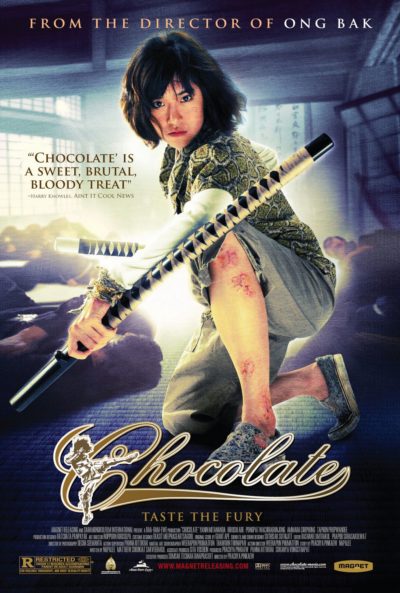 We couldn’t wait for this one to get an official American release, so off to Ebay we went for a copy of uncertain origin. This was something of a double-edged sword. It means we get to tell you that this is, hands down, the action heroine film of the year, with fights the like of which I haven’t seen since Yuen Wo Ping was working with Cynthia Khan in Hong Kong. However, it also means that we had to suffer the worst set of English subtitles I think we have ever seen, which appear to have been pushed enthusiastically through Babelfish several times, with feeling; this culminated in a line which will live forever in my memory. It is, and I quote the subtitle in its entirety, “Wang monkeys.” You’ll thus forgive me if the subtleties of the plot were perhaps lost on us, though by most accounts, this likely improved our enjoyment of the endeavour overall.
We couldn’t wait for this one to get an official American release, so off to Ebay we went for a copy of uncertain origin. This was something of a double-edged sword. It means we get to tell you that this is, hands down, the action heroine film of the year, with fights the like of which I haven’t seen since Yuen Wo Ping was working with Cynthia Khan in Hong Kong. However, it also means that we had to suffer the worst set of English subtitles I think we have ever seen, which appear to have been pushed enthusiastically through Babelfish several times, with feeling; this culminated in a line which will live forever in my memory. It is, and I quote the subtitle in its entirety, “Wang monkeys.” You’ll thus forgive me if the subtleties of the plot were perhaps lost on us, though by most accounts, this likely improved our enjoyment of the endeavour overall.
Zen (Vismistananda) is the autistic daughter of a Japanese gangster and a Thai woman (Siripong), who betrayed her local partner, a rival boss (Wachirabunjong), to be with her lover. When her mother gets cancer, it’s up to Zen and a chubby friend (Phobwandee) to collect on debts owed. Fortunately, Zen has a sponge-like ability to learn martial arts, be it from Tony Jaa movies on TV, or the school next door, and proves herself adept at “encouraging,” shall we say, repayments from those who are reluctant to pony up. The bad news is, this attracts the attention of her mother’s former employer, who has not forgotten the past and is unwilling to let matters lie. Which, inevitably, leads to a showdown where Zen takes on an apparently infinite line of henchmen – it’s somewhat reminiscent of Kill Bill, Volume 1, in the same way an earlier ice-house battle reminded me of The Big Boss, However, the final fight, on a series of balconies, is bone-shatteringly unique.
If Vismistananda isn’t yet quite up to the level of Jaa – there’s nothing quite like the five-minute, single shot fight scene in The Protector – she is amazingly lithe and powerful, quite belying her waif-like physique. There is some use of undercranking and wire-work that occasionally distracts from her natural talent, as much as it enhances it, and I have to wonder if the ‘autism’ plot-device was a cunning plot to cover for lack of actual actimg talent, though this angle is not played anywhere near as exploitatively as it could be. Still, if the dramatic aspects are somewhat perfunctory and uninteresting, the fight scenes more than make up for these shortcomings, and the result is quite the kick-ass action flick.





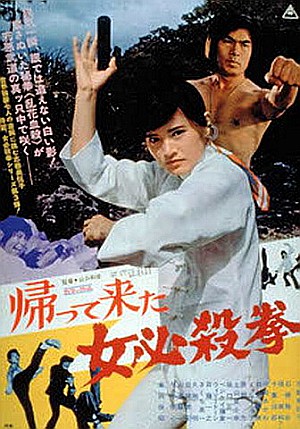 The third in the series loses a lot of the loopy insanity that made the first one such a classic. Shiomi is still as kick-ass a heroine as ever, but I have to say, it was a severe struggle to remain conscious throughout, despite the brief 77-minute running time. By most accounts, the story is largely a re-tread of the second film, with Koryu Lee (Shiomi) going from Hong Kong to Yokohama, to track down a missing woman, only to find herself crossing paths, swords and a variety of other weapons, with local organized crime – since the target of her search is now the mistress of Oh Ryu Mei (Yamamoto). He pits wannabe warriors against each others in death matches, to decide who is fit to become a minion, only to find Lee is more than up to taking them on. He turns to freelancer Kurosaki (Kurata), who agrees to take out the unwanted snooper for twenty million yen.
The third in the series loses a lot of the loopy insanity that made the first one such a classic. Shiomi is still as kick-ass a heroine as ever, but I have to say, it was a severe struggle to remain conscious throughout, despite the brief 77-minute running time. By most accounts, the story is largely a re-tread of the second film, with Koryu Lee (Shiomi) going from Hong Kong to Yokohama, to track down a missing woman, only to find herself crossing paths, swords and a variety of other weapons, with local organized crime – since the target of her search is now the mistress of Oh Ryu Mei (Yamamoto). He pits wannabe warriors against each others in death matches, to decide who is fit to become a minion, only to find Lee is more than up to taking them on. He turns to freelancer Kurosaki (Kurata), who agrees to take out the unwanted snooper for twenty million yen.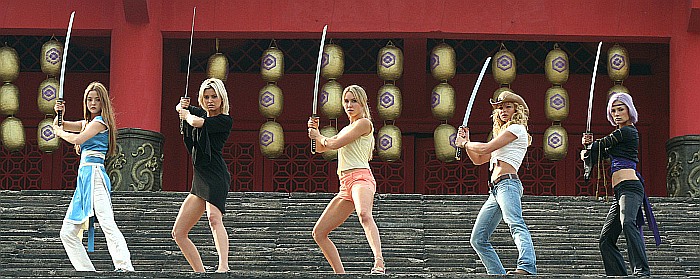 ★★★½
★★★½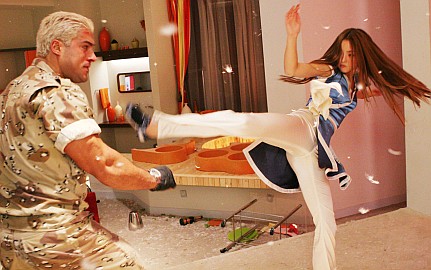 And…it’s not as bad as we feared it might be. Admittedly, I am not the best person to judge its merits in comparison to the video-game from which it was adapted. While I’ve mashed buttons on it and got my ass kicked by our son occasionally (and, somewhat oddly, Dead or Alive Xtreme Beach Volleyball, despite being a jiggle-fest of epic proportions, was a great favourite of our
And…it’s not as bad as we feared it might be. Admittedly, I am not the best person to judge its merits in comparison to the video-game from which it was adapted. While I’ve mashed buttons on it and got my ass kicked by our son occasionally (and, somewhat oddly, Dead or Alive Xtreme Beach Volleyball, despite being a jiggle-fest of epic proportions, was a great favourite of our 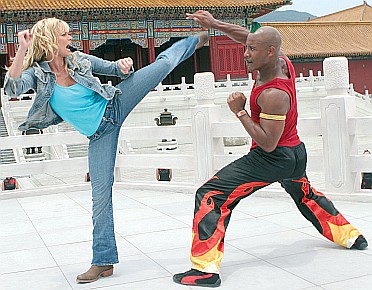 It remains, however, a movie based on a video-game, and almost inevitably this means the storyline is absolute pants. Yet another martial-arts tournament, sponsored by a rich ne’er-do-well; has
It remains, however, a movie based on a video-game, and almost inevitably this means the storyline is absolute pants. Yet another martial-arts tournament, sponsored by a rich ne’er-do-well; has 














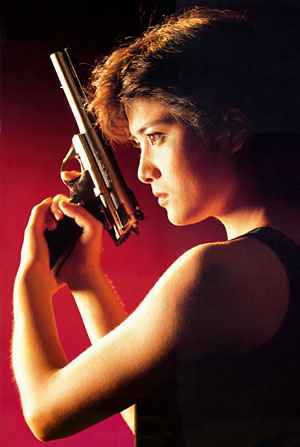 Firstly, in case you’re wondering, there
Firstly, in case you’re wondering, there 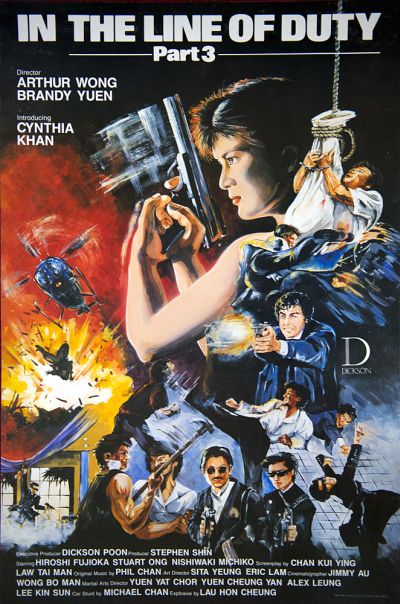
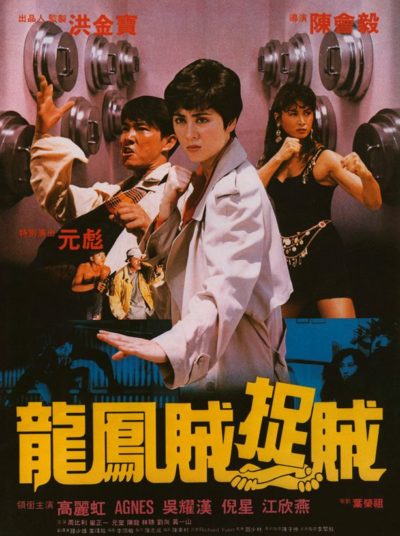 This is an largely over-looked gem, featuring the future Mrs. Samo Hung (Godenzi – they married in 1995) in a role and performance which are so excellent, as to make you wonder why she apparently quit the cinema the following year [though she does have a cameo in Mr. Nice Guy, appearing in the cooking show audience]. She first came to attention in Eastern Condors and, despite a lack of training, developed a graceful, fluid style of action that works well. Her best known vehicle is She Shoots Straight, but for my money, this is even better.
This is an largely over-looked gem, featuring the future Mrs. Samo Hung (Godenzi – they married in 1995) in a role and performance which are so excellent, as to make you wonder why she apparently quit the cinema the following year [though she does have a cameo in Mr. Nice Guy, appearing in the cooking show audience]. She first came to attention in Eastern Condors and, despite a lack of training, developed a graceful, fluid style of action that works well. Her best known vehicle is She Shoots Straight, but for my money, this is even better.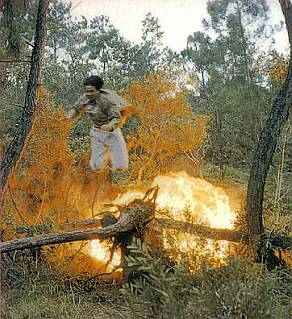 Godenzi is great, putting over a great combination of coolness and charisma, with a confident attitude that’s wholly justified. It’s established in the first scene that she
Godenzi is great, putting over a great combination of coolness and charisma, with a confident attitude that’s wholly justified. It’s established in the first scene that she 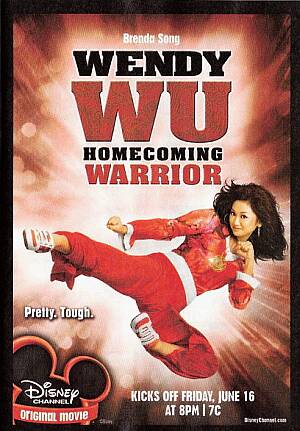 It’s kinda sad to say, but the action in this Disney TV movie kicks the ass of, not only most TV shows, but a credible number of Hollywood films. Then again, behind the fights here is Koichi Sakamoto, who is also responsible for Drive, among the best American martial-arts films of all time. And while obviously “Disneyfied”, this is still sprightly and engaging, with a couple of very decent fight sequences. It is, however,
It’s kinda sad to say, but the action in this Disney TV movie kicks the ass of, not only most TV shows, but a credible number of Hollywood films. Then again, behind the fights here is Koichi Sakamoto, who is also responsible for Drive, among the best American martial-arts films of all time. And while obviously “Disneyfied”, this is still sprightly and engaging, with a couple of very decent fight sequences. It is, however, 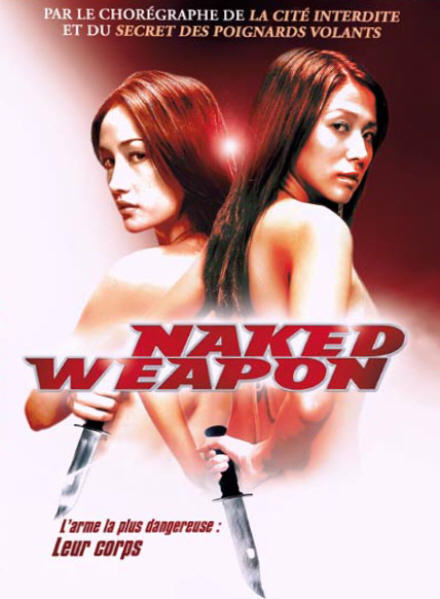
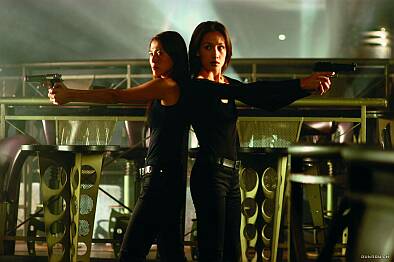 Instead, there’s a laughable scene after an assassination attempt on her by Jill, at the behest of Madam M, who realises she could lose Charlene back to her mother. Jack ends up carrying the wounded parent to the hospital, but keeps stopping to converse with Charlene, which had us screaming, “The hospital! It’s over
Instead, there’s a laughable scene after an assassination attempt on her by Jill, at the behest of Madam M, who realises she could lose Charlene back to her mother. Jack ends up carrying the wounded parent to the hospital, but keeps stopping to converse with Charlene, which had us screaming, “The hospital! It’s over 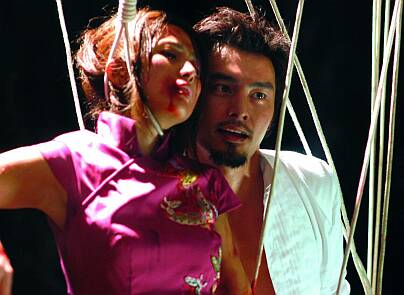 Is it better than Naked Killer? A difficult call, and one that likely depends on your state of mind – as well as whether the word “good” could ever be applied to Killer, a lurid blast that really could come from Hong Kong, and probably only from before the Chinese takeaway of the colony. Weapon is certainly better-crafted and has more crossover appeal: our son was going to pick it up in Blockbuster, till we informed him it was already part of our unwatched pile. On the whole, I think Weapon is the one more likely to be watched again in future – if only because Killer would require the room to be carefully swept for lurking minors and maiden aunts first.
Is it better than Naked Killer? A difficult call, and one that likely depends on your state of mind – as well as whether the word “good” could ever be applied to Killer, a lurid blast that really could come from Hong Kong, and probably only from before the Chinese takeaway of the colony. Weapon is certainly better-crafted and has more crossover appeal: our son was going to pick it up in Blockbuster, till we informed him it was already part of our unwatched pile. On the whole, I think Weapon is the one more likely to be watched again in future – if only because Killer would require the room to be carefully swept for lurking minors and maiden aunts first.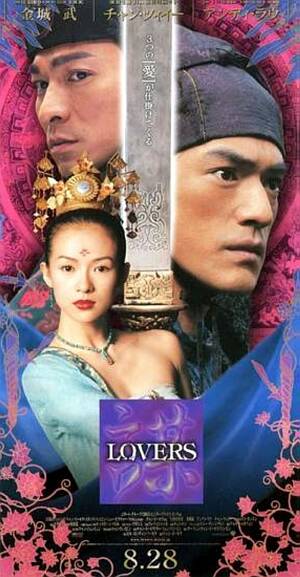 Since the success of Ang Lee’s Crouching Tiger, fellow arthouse director Zhang Yimou seems to have become obsessed with one-upping Lee. First was Hero, a sumptuous and multi-levelled tale of revenge and betrayal starring Jet Li; now, we get House which while slightly smaller in scale, is clearly going for the same tragically romantic feel as CTHD. Policeman Leo (Lau) suspects Mei (Zhang), an arrested blind prostitute, is part of the titular rebel group, so sends Jin (Kaneshiro) to win her confidence by helping her ‘escape’, then going with her to the Flying Daggers’s base. However, it gives nothing away to say that Mei and Jin start having feelings for each other, as they battle through the countryside, and it’s no surprise to discover that several other characters aren’t what they seem either.
Since the success of Ang Lee’s Crouching Tiger, fellow arthouse director Zhang Yimou seems to have become obsessed with one-upping Lee. First was Hero, a sumptuous and multi-levelled tale of revenge and betrayal starring Jet Li; now, we get House which while slightly smaller in scale, is clearly going for the same tragically romantic feel as CTHD. Policeman Leo (Lau) suspects Mei (Zhang), an arrested blind prostitute, is part of the titular rebel group, so sends Jin (Kaneshiro) to win her confidence by helping her ‘escape’, then going with her to the Flying Daggers’s base. However, it gives nothing away to say that Mei and Jin start having feelings for each other, as they battle through the countryside, and it’s no surprise to discover that several other characters aren’t what they seem either. Perhaps I was expecting too much, after reading reviews that
Perhaps I was expecting too much, after reading reviews that  I liked, and enjoyed the original film, and at first, this seems to have a great chance at surpassing it. The opening fight between our two heroines, one (Choi) a slave-trader, the other (Chung) an enforcer for the Empress, is a masterpiece that combines wire-work, CGI and gimmickry – camerawork from Azumi and what looks like a mutant Klingon batleth – to fabulous (if not fully convincing) effect. All this in a mythical kingdom where women rule, and men are reduced to “dumbbells”, while the cast includes both Jackie Chan and Donnie Yen. Even if the connection to the original is tenuous at best, the potential here doesn’t need to be specified.
I liked, and enjoyed the original film, and at first, this seems to have a great chance at surpassing it. The opening fight between our two heroines, one (Choi) a slave-trader, the other (Chung) an enforcer for the Empress, is a masterpiece that combines wire-work, CGI and gimmickry – camerawork from Azumi and what looks like a mutant Klingon batleth – to fabulous (if not fully convincing) effect. All this in a mythical kingdom where women rule, and men are reduced to “dumbbells”, while the cast includes both Jackie Chan and Donnie Yen. Even if the connection to the original is tenuous at best, the potential here doesn’t need to be specified.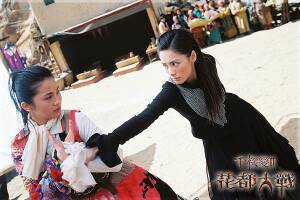 On the plus side, both Twins put in surprisingly solid performances – Choi, in particular, is much less irritating than before, though remains outshone by Chung. However, they still aren’t enough on their own to sustain a movie, despite the parade of celebrity cameos, especially when co-stars Chen and Fong are woefully short of the mark. With a $10.2 million budget, I just wish they’d spent a few more dollars on the script and some decent actors. Then, it might have lived up to the marvellous first fifteen minutes.
On the plus side, both Twins put in surprisingly solid performances – Choi, in particular, is much less irritating than before, though remains outshone by Chung. However, they still aren’t enough on their own to sustain a movie, despite the parade of celebrity cameos, especially when co-stars Chen and Fong are woefully short of the mark. With a $10.2 million budget, I just wish they’d spent a few more dollars on the script and some decent actors. Then, it might have lived up to the marvellous first fifteen minutes.